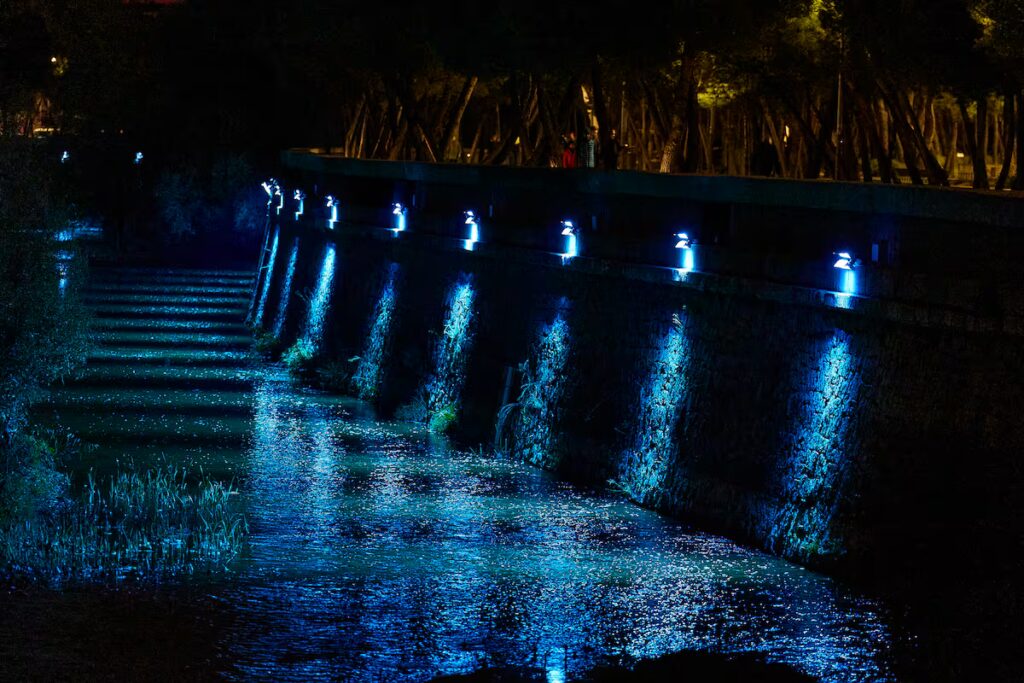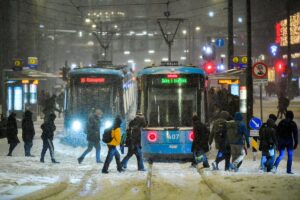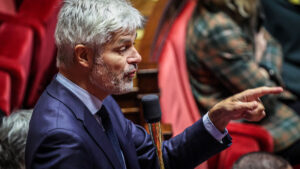
Last Saturday, at the same time as the Christmas lights were turned on, the bed of the Manzanares River was lit up in “PP blue”. Unlike the promotion that the Madrid City Council has done with its 13 million light bulbs or its giant lighting systems to celebrate this time of year, the lights of Manzanares went on without warning, taking by surprise neighbors and environmentalists who have been calling for this not to happen for more than a year. “They did it deliberately, because they know that if we found out we would have edited something and ruined the photo,” says Susana de la Higuera, president of the Pasillo Verde-Imperial Neighborhood Association.
In the summer of 2024, the Municipality had already installed the lights with the aim of turning them on during last Christmas, but the neighborhood association and Ecologistas en Acción presented a contentious-administrative appeal to the Courts to prevent this. Shortly afterwards they also asked for precautionary measures, with the aim of stopping any action and thus “avoiding damage to the biodiversity of the river until there is a final sentence”. Both neighbors and experts have denounced the damage that this light pollution would cause to the fauna that populates the river, mainly birds, and have presented four expert reports to the judge to justify it.
When last November arrived, the month in which the lights are turned on every year, Manzanares remained turned off because the precautionary measures had not yet been resolved. But in July of this year the judge finally responded with the denial. “Even though the precautionary measures were not resolved, we were calm because it meant that the lights could not be turned on, but this year it was possible to do so,” says De la Higuera. Although the administrative dispute is still ongoing, the city council has given itself free rein to keep the promise – which no one had asked for, according to the neighbor – to illuminate the waters of the river.
Only last Sunday did the Municipality make it known, with a press release, that the lights of Manzanares had finally been turned back on. There are 61 floodlights with LED bulbs installed along 560 meters of the river bed, precisely in dam number six, between the Oblique Bridge and the Andorra footbridge, and they work remotely to change the intensity and colors of the spotlights. The lighting will be activated between Friday and Sunday from 6.30 pm. to 10 p.m., but a detail that caught the attention of neighbors and environmentalists is that the announcement clarifies that from next January 30 the hours will be changed depending on the sunlight, which means that the lights have arrived not just for Christmas, but for the whole year.
“We are also worried that they say this is a pilot project, so it could spread throughout the river or other areas of the city,” complains Lola Méndez, a member of Ecologistas en Acción and Pasillo Verde-Imperial and a resident of the area. She, like the rest of the inhabitants of Madrid Río, has no doubts about it, they are sure that it will spread.
Méndez assures that at this moment it is not possible to evaluate the damage that these “disco” lights will cause to the fauna and flora, but it will be in spring, when the migratory season arrives, when we will see whether the birds will be able to raise their chicks there or will have to migrate elsewhere. For her it is clear that the Municipality knows that the lights are harmful because in the press release they state that the installation “was developed using solutions that minimize light pollution” and that the spotlights “are located in a pocket of the river, limiting light emissions towards the sky”.
One of the justifications provided by the municipal administration is that the lights increase the safety of the area. “It’s a complete lie,” De la Higuera says bluntly. “There is no problem of insecurity in that area and, if there were, the logical thing would be for the lights to be installed on the road, not in the riverbed.” The president of the neighborhood association adds that this action is focused more on tourism than on the neighbors – who so far have not complained because the lights hit them directly – because it is an absolutely “unnecessary” project.





